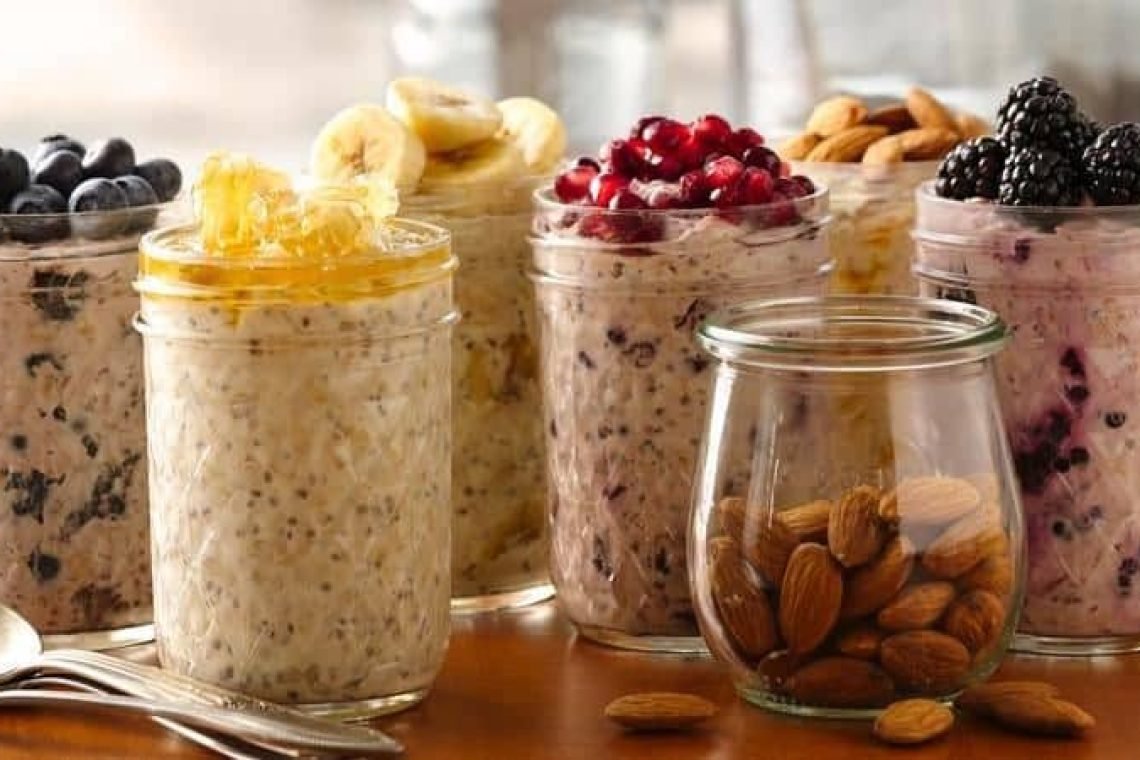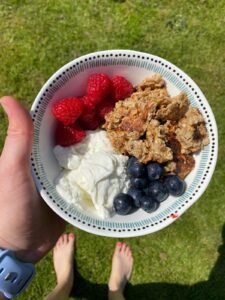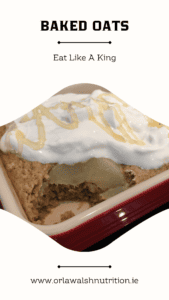Overnight oats are a great option when you’re time-poor. Simply make them at night the following few days to save yourself the effort of make them every night. Mix them together in a portable container, or in a bowl, depending on whether you plan to eat them at your desk or the in comfort of your own home. Although they’re often eaten cold, you can heat them up in the microwave on colder mornings.
For details on the calories, protein, fibre and more, please read below.
Ingredients
- 1/2 cup milk
- 1/2 cup yoghurt
- 1/2 cup oats
- Fruit/ vegetables
- 2 dsp of seeds or a small handful of nuts (e.g. 15 grams)
- Add something to flavour it
How to make it
- Place everything in a bowl or portable container. Mix it all together and leave overnight in the fridge.
- Eat hot or cold the next day.
A little bit about the nutrition
Remember, most adults need about 20 grams (to 40 grams) of protein at each meal.
To add more protein use cows, goats, sheep, pea or soya milk rather than almond, hazlenut, rice, oat or coconut milk. The milk alternatives, with the exception of pea or soya milk, provide negliable amounts of protein.
Additionally, instead or using natural yoghurt or soya yoghurt, you could choose a higher protein yoghurty option such as Greek yoghurt, skyr or quark. Generally Greek yoghurt skyr or quark provide twice if not three times the protein of natural yoghurt or soya yoghurt.
It’s worth looking at the protein content of your Greek yoghurt as some of the yoghurts on the market contain less protein than natural yoghurt. They tend to be Greek style as they’re lovely and thick, with tasty amounts of fat within it. What you can expect from a real Greek yoghurt is about 6 grams of protein per 100g if it’s a regular greek yoghurt and 10 grams per 100 grams if it’s a 0% fat greek yoghurt. Quark provides 12 grams of protein per 100 grams while Skyr provides 10 grams of protein per 100g.
Examples of the nutritional breakdown
If you’re following a standard 2000 calorie a day diet, each meal should contain about 650 calories. Ideally, we would all be eating about 25 to 35 grams of fibre each day which means about 8 to 12 grams per meal. As I mentioned above, you’re aiming for about 20 to 40 grams of protein per meal.
For a lower calorie option, choose 0% fat greek yoghurt, low fat milk, oats and a lower calorie fruit e.g. raspberries. This provides 26 grams of protein, 7 grams of fibre and just 333 calories per bowl. Add the likes of vanilla extract and your breakfast won’t dissappoint.
Using regular Greek yoghurt (5%) and regular milk doesn’t make too much of a difference to the numbers, but can really add to the taste. Providing 23 grams of protein, 7 grams of fibre and just 414 calories, you could very well argue that little bump up is well worth the increase in taste. Plus, it’ll add more healthy fats which can really balance out the meal.
To add more healthy fats consider adding some nuts or seeds. Adding 15 grams of nuts or seeds will boost your fibre intake by 1 to 3 grams brining it up to 8 to 10 grams per bowl. Add some more fruit, and you’ll comfortably hit the higher end of the range with this meal.
Want some inspiration on the flavour side of things?
The best guide for what tastes nice in your overnight oats (aka summer porridge) is your favourite desserts. See below for some tasty inspo! Enjoy!
| Banana Bread | Banana, cinnamon, pecans |
| Apple Strudel | Apple, mixed spice, raisins, walnuts |
| Pear and Almond tart | Pear, raspberries/ cherries, flaked almonds, almond extract |
| Chocolate cake | Cocoa, chopped dates, linseeds. |
| Carrot cake | Grated carrot, raisins, cinnamon, walnuts +/- pineapple |
| Peaches & cream | Peaches, chia seeds, vanilla extract |
| Strawberries & cream | Strawberries, sunflower seeds, vanilla extract |
| Tropical delight | Pineapple, mango, desiccated coconut. |











